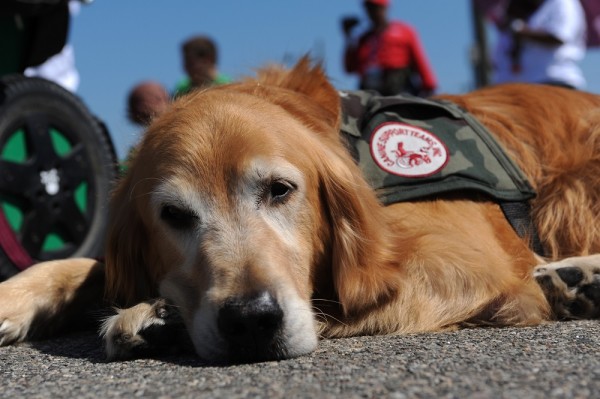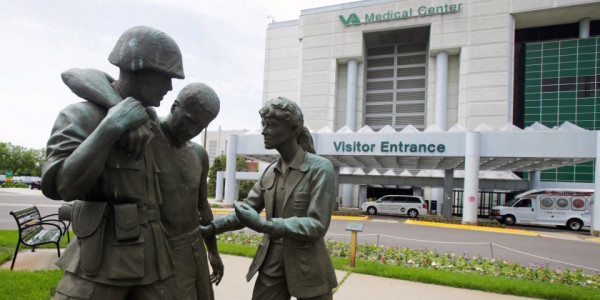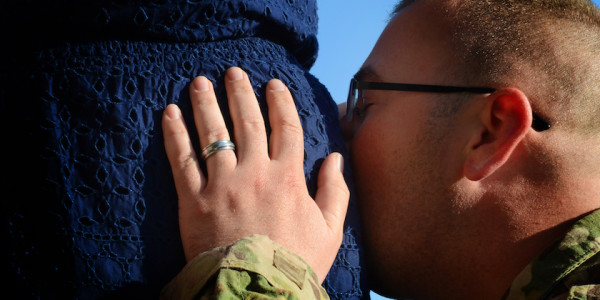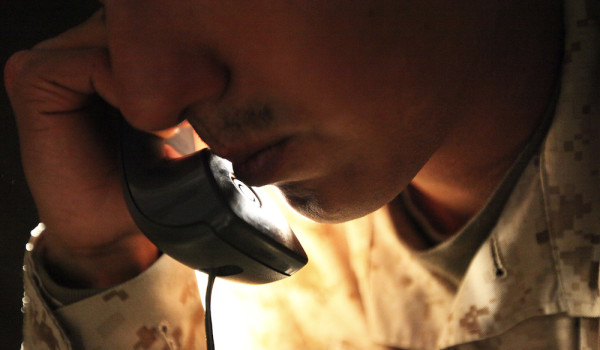In recent years, there have been significant policy changes at the Department of Veterans Affairs regarding the admittance of service dogs at healthcare facilities, though in some cases they still face restrictions. Specifically, service dogs are prevented from staying overnight during inpatient care.
This is due to both safety concerns and the burden that caring for a service dog might place on VA staff, explained Joyce Edmondson, an analyst for the department’s Rehabilitation and Prosthetic Services in an interview with Task & Purpose.
“Service dogs are not allowed overnight in inpatient units, except for long-term care where the dog would be a part of the treatment plan,” like a blind veteran recovering from a hip replacement or going through physical rehabilitation, explained Edmondson, who works on programs and policy regarding medical, surgical devices and service or guide dogs.
“I guess it’s always a safety concern with the dog,” said Edmondson. “But the reason we don’t allow them in the acute care units, is because typically, if you’re sick enough to be in an acute care bed in today’s medical world, you’re not able to get up and take care of your dog and handle whatever the dog needs. That would put it on medical staff and the VA is very adamant that our medical staff will not have to care for the veteran’s dog.”
However, Edmondson notes that in some cases of overnight care it makes sense for a veteran’s service dog to be present.
“With a long-term unit, veterans are doing some of their own care and are transitioning to doing a lot of their own care at home, so it makes sense to have the dog with them to support them,” she said.
Edmondson worked on the 2015 department-wide policy change allowing greater access to service dogs at VA facilities. Before that time, the decision on whether or not to allow service dogs at VA healthcare sites was left up to the medical center’s director to decide, Edmondson explained.
A Jan. 5 Military Times article reported how Army veteran Kermit Scott was devastated after recently being told that his service dog was unable to come with him to inpatient care for post-traumatic stress treatment at a VA facility in American Lake, Washington.
“I have friends who went through the program and it benefited them to the point where they could go out in public,” said Scott, who suffers from night terrors, social anxiety, is a veteran of Iraq and Afghanistan and earned a Purple Heart for injuries that include a gunshot wound, toe amputation, and blast-related brain injuries.
“Cooper helps with my stability; he can tell when I’m having tremors and need assistance,” said Scott of his a black Labrador retriever. “He opens up doors, turns on the lights, gets my shoes.”
Military Times reports that officials at the VA Puget Sound Health Care System, which oversees the facility in American Lake, said they “had not denied admission to any veteran due to service animal policy,” adding that: “Standard operating procedures for accepting a service animal into the treatment program were not in place due to the myriad accommodations that needed to be addressed.”
The department is considering further changes to its policy, and has asked veterans to provide information on their service dogs through the Federal Register, Edmondson explained.
“We ask that if you come to stay for a long time, two weeks or four weeks whatever it is, we ask that you be able to show documentation of the dog’s health records,” she said. “It’s because the dog is potentially going to be around other dogs, and certainly around other veterans, employees and we want to make sure the dog is up-to-date on shots and immunizations and evacuations, and that part is just a safety and health issue.”









